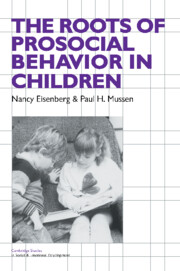Book contents
- Frontmatter
- Contents
- Preface
- 1 Introduction
- 2 Methodological and theoretical considerations in the study of prosocial behavior
- 3 Biology and prosocial behavior
- 4 Culture and prosocial behavior
- 5 “Person” variables and prosocial behavior
- 6 Socialization in the family
- 7 Socialization by agents outside the family
- 8 Cognition, role taking, interpersonal problem solving, and moral judgment
- 9 Emotional factors in prosocial behavior
- 10 Situational determinants
- 11 Conclusions
- References
- Name index
- Subject index
2 - Methodological and theoretical considerations in the study of prosocial behavior
Published online by Cambridge University Press: 31 December 2009
- Frontmatter
- Contents
- Preface
- 1 Introduction
- 2 Methodological and theoretical considerations in the study of prosocial behavior
- 3 Biology and prosocial behavior
- 4 Culture and prosocial behavior
- 5 “Person” variables and prosocial behavior
- 6 Socialization in the family
- 7 Socialization by agents outside the family
- 8 Cognition, role taking, interpersonal problem solving, and moral judgment
- 9 Emotional factors in prosocial behavior
- 10 Situational determinants
- 11 Conclusions
- References
- Name index
- Subject index
Summary
The form and content of acts such as caring, sharing, and helping are shaped by a host of factors - age, personality characteristics, motivations, capabilities, judgments, and the immediate situation - and intricate interactions among them. In recent years, investigators have tried to develop models for prosocial responding that capture some of this complexity and provide guidelines for the study of prosocial behavior (Eisenberg, 1986; Piliavin, Dovidio, Gaertner, & Clark, 1981; Schwartz & Howard, 1984; Staub, 1978, 1979) (see chapter 11). However, no single investigation, no matter how extensive and well designed, could possibly explore all, or even a substantial proportion, of the determinants of prosocial behavior.
Researchers therefore approach the study of prosocial development problems in the only way possible: by selecting one (or at most a few) of the potentially significant antecedents and investigating its (their) contributions to particular forms of prosocial behavior (e.g., sharing or donating to charity). The categories of antecedents that appear to be powerful influences on the acquisition and development of prosocial behavior (e.g., biological, cognitive, and cultural factors) are discussed later in this chapter. In chapter 3-11 we survey what is known about the variables subsumed by each of these categories.
Before proceeding, we must examine how research on prosocial behavior is conducted. The first issue to consider is that of operational definitions, the actual behavior the investigator observes or measures when assessing prosocial actions or predispositions.
- Type
- Chapter
- Information
- The Roots of Prosocial Behavior in Children , pp. 12 - 34Publisher: Cambridge University PressPrint publication year: 1989

